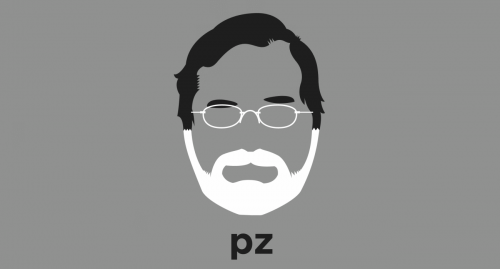Here are six books that come highly recommended: the were on the Royal Society shortlist for the Insight Investment Science Book Prize this year. I’ve got two of them, I should probably add some more.
The Most Perfect Thing by Tim Birkhead
The Hunt for Vulcan by Thomas Levenson
Cure by Jo Marchant
The Planet Remade by Oliver Morton
The Gene by Siddhartha Mukherjee
The Invention of Nature by Andrea Wulf
Notice anything about the range of books and authors?
My first thought was that hey, 5 of the 6 are about biology or the environment. Excellent!
The winner is the book by Andrea Wulf, which raised a curious concern in the mind of an editor at The Guardian — by gosh, 2 of the 6 were written by women. Isn’t that remarkable? As he notes, women haven’t normally been recognized for science writing.
In the previous 10 years, only three out of 60 Royal Society shortlistees were female, with precisely zero women appearing on the shortlist between 2010 and 2013.
An injustice is slowly being corrected, I would say. But that’s not the interpretation Dugdale reaches for, strangely. As Tom Levenson (note: one of runners-up for the prize) notices:
Five days after the award was announced, John Dugdale, the associate media editor of The Guardian, wrote a piece that asked “Why have women finally started winning science book prizes?” You might think: Good question! Women have been writing great science books for a long time now. Why haven’t more of them been recognized?
But that’s not why Dugdale asked the question. According to him, the Royal Society caved to pressure created by the example of another “more female-friendly” prize. His piece suggests that the judges’ taste is shifting from “male” approaches to science writing that emphasize “a problem, a mystery, or an underexplored scientific field,” towards a feminine tendency “to focus on people.”
My jaw dropped at that clumsy attempt to impose a peculiar gender essentialism on science writing. Levenson must be exaggerating. But no, that’s exactly what he said.
So perhaps female science writers are more likely to focus on people, while their male counterparts are more likely to address a problem, a mystery or an underexplored scientific field.
He goes further to somehow divide the attendees at the awards ceremony by sex. Somehow, he thinks there is some significant difference between these books based on the sex of the author, which is just plain weird.
The men on the shortlist introduced books about geo-engineering, eggs, the hunt for a non-existent planet and the history of genes. In contrast, Wulf enthused about her globetrotting genius and Jo Marchant read a passage from her exploration of mind-over-body healing, Cure – the only extract that reached for the messy subjectivity of the first person.
Has he even read these books? There’s just no way to split them into only two categories in a way that neatly segregates the Wulf and Marchant books into a common pigeonhole. Maybe he sensed a magical “estrogen vibe” at the ceremony that then suffused the books. Or maybe I had failed to notice that the authors of books written in the first person, like American Psycho, Fight Club, Moby Dick, All Quiet on the Western Front, Post Office, and The Curious Incident of the Dog in the Night-Time were all women. The surprising things you can learn from media editors at major newspapers…
Also, don’t miss GrrlScientists scathing takedown of Dugdale.




